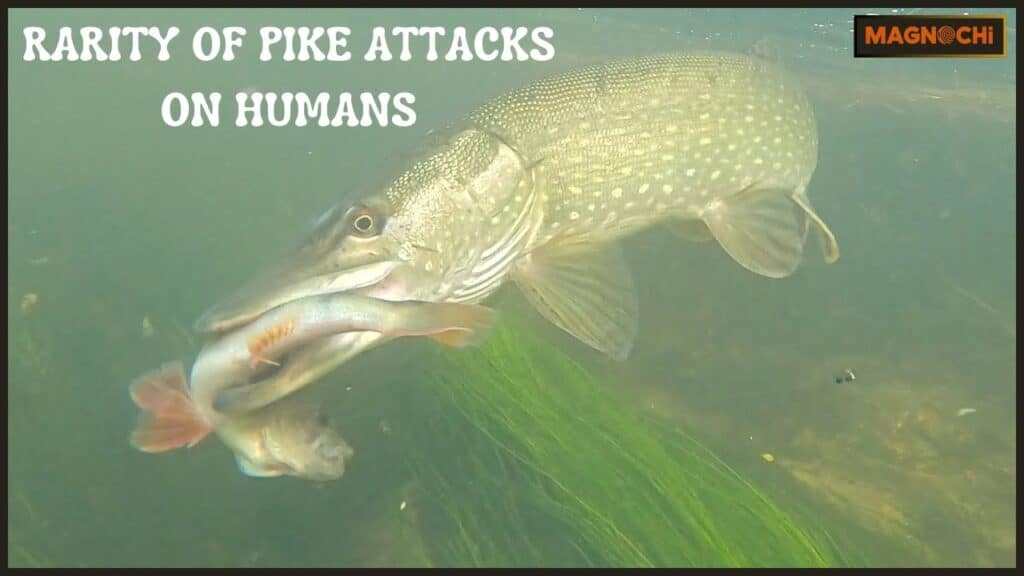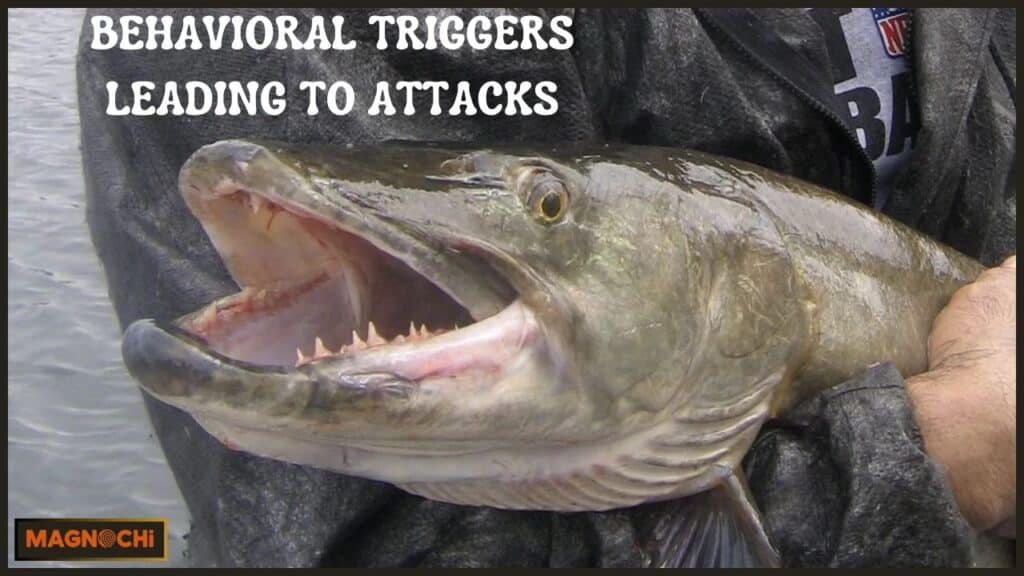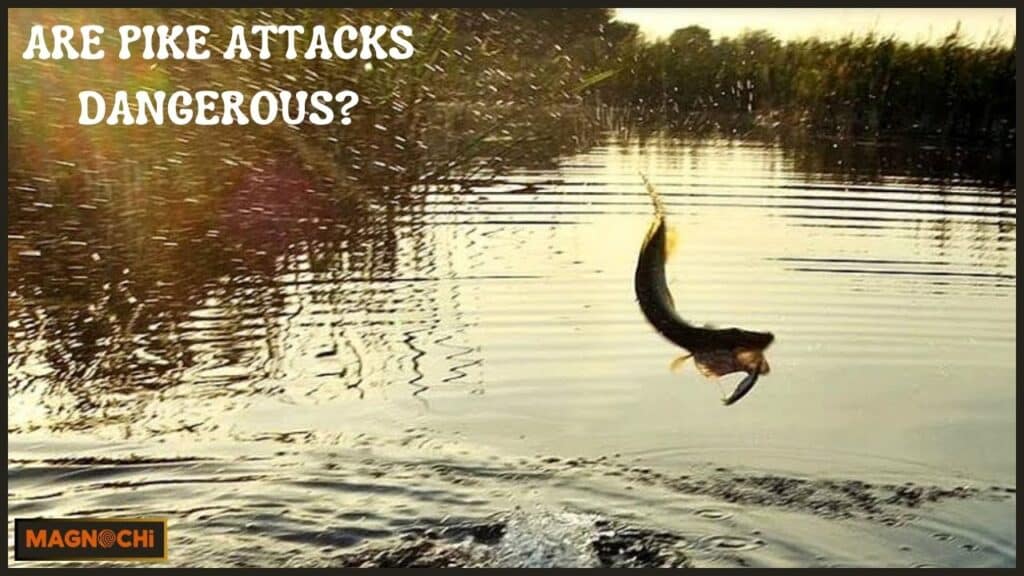Do Pike Attack Humans? Pike, with their long bodies, sharp teeth, and predatory instincts, often provoke both fascination and fear. These freshwater fish, found in lakes, rivers, and marshes around the world, are notorious for their ambush hunting tactics and aggressive behavior toward smaller creatures.
But when it comes to humans, many people wonder: Do pike actually attack humans? Or are these fears the result of misconceptions, myths, and the misunderstood nature of these ancient predators?
In this comprehensive blog post, we will delve deep into the behaviors, biology, and incidents related to pike attacks on humans.
Whether you’re a fisherman, a swimmer, or just someone interested in the fascinating world of freshwater predators, this article will give you a thorough understanding of pike attacks, the risk of injury, and how to safely coexist with these remarkable fish.
What Are Pike?
Before we dive into the specifics of pike behavior, it’s important to understand what makes these fish so unique and how their physical and behavioral traits contribute to their interaction with humans.
Pike (Esox lucius) are ambush predators that thrive in freshwater ecosystems across North America, Europe, and parts of Asia. With their sleek, elongated bodies, sharp, serrated teeth, and large predatory jaws, pike have earned a reputation as aggressive predators in the wild.
Key Characteristics of Pike:
- Size: Pike are known to reach impressive lengths, with some individuals growing up to 5 feet long, weighing over 50 pounds. The largest pike on record was caught in Germany and measured 5 feet 1 inch (155 cm) long, weighing an astounding 64 pounds.
- Diet: Pike are carnivores, feeding primarily on smaller fish, frogs, waterfowl, and even small mammals. They hunt using their predatory instincts and ambush strategies, making them highly effective hunters in the wild.
- Teeth and Jaws: Their large, sharp teeth are perfect for catching and holding onto slippery prey. Pike can bite with incredible force, delivering a powerful strike to secure their meals.
These traits make pike formidable predators, but it’s their behavior that truly defines how they interact with humans.

Do Pike Attack Humans?
Given their predatory nature, the question on many people’s minds is: Do pike attack humans? In most cases, the answer is no. Pike do not actively hunt humans or consider them as food.
However, there are instances where pike bites occur, and these events often involve mistaken identity, self-defense, or a startled pike acting out of fear.
Do Pike Actively Hunt Humans?
Pike are carnivores, but they typically focus on small fish, frogs, and other aquatic creatures. Humans do not fit into their natural prey category.
Therefore, pike attacks on humans are rare and accidental, often caused by circumstances where a pike mistakes a part of a human for prey. [Do Pike Attack Humans?]
In the wild, pike are known to exhibit ambush behavior. They often lie in wait for unsuspecting prey to pass close by. They are ambush predators, and their hunting style revolves around quick, surprise strikes to capture smaller creatures.
When a human is present in the water, whether swimming or fishing, it is highly unlikely that a pike will actively target them unless it feels threatened or confused.
Are Pike Aggressive Toward Humans?
While pike are aggressive predators, their aggression is typically reserved for smaller animals within their ecosystem.
In rare cases, a pike may bite if it feels threatened or cornered, but these incidents are not the result of predatory aggression directed at humans.
Pike behavior is not inherently dangerous to humans unless provoked. So, when we see reports of pike bites, they are typically the result of the fish being startled, mistaking a human part for prey, or reacting defensively.
Accidental Encounters
Most incidents where a pike bites a human happen due to accidental encounters. Swimmers, for example, may unknowingly enter a pike’s territory, or anglers may handle a pike too roughly while fishing, provoking a defensive strike.
Rarity of Pike Attacks on Humans
The good news is that pike attacks on humans are extremely rare. According to experts, fewer than 10 confirmed incidents of pike bites on humans are reported globally each year.
These bites typically result in minor injuries, such as cuts or puncture wounds, and are rarely life-threatening. [Do Pike Attack Humans?]

Pike, unlike some other predatory fish, are not interested in humans as a food source. Their diet is mostly fish, amphibians, and small mammals prey that is much easier for them to catch and subdue.
Why Are Pike Attacks So Rare?
There are several reasons why pike attacks on humans are so uncommon:
- Humans are not natural prey: Pike do not view humans as food. While they are aggressive predators in their environment, humans simply aren’t on their menu.
- Bites are usually a mistake: When pike bite humans, it’s most often a case of mistaken identity. A human’s hand, foot, or lure may resemble the fish or other prey that pike are used to hunting.
- Human presence doesn’t usually provoke pike: Pike are naturally shy and tend to avoid larger animals, including humans. Most pike bites happen when a human unknowingly invades a pike’s personal space or territory.
In fact, a pike attack on a human is so rare that most anglers and swimmers will never experience one in their lifetime. Even when bites do occur, they are generally non-life-threatening and result in minor injuries.
Reasons for Pike “Attacks” or Bites
While it’s clear that pike do not actively hunt humans, there are still a few key reasons why a pike might bite a human. Most of these reasons revolve around either mistaken identity or self-defense.
Mistaken Identity
As mentioned, pike are ambush predators that use their vision to track down prey. Their sharp teeth are designed for catching smaller fish, frogs, and other aquatic animals.
When a human is swimming or fishing, a pike may mistake a hand, foot, or part of a lure for something it would typically prey on.
The shiny appearance of fishing lures can further attract pike, as they can resemble the flash of a small fish in the water. A curious pike may strike at a lure or a hand in the water, not out of malice, but because it has mistaken it for prey.
Self-Defense and Fear
Like many wild animals, pike will bite in self-defense if they feel threatened. This is more likely to happen if a pike is cornered, trapped, or handled too roughly by an angler. [Do Pike Attack Humans?]
In such cases, a pike may lash out in an attempt to escape or protect itself from perceived harm.
Pike are generally not aggressive toward humans unless they feel threatened or stressed. During the spawning season, pike may become more territorial, which increases their likelihood of biting if they feel their space is being invaded.
Aggression Triggered by Spawning
During the spawning season, pike experience increased aggression. This is common among many species of fish, as they defend their territory to protect their eggs.
If a human enters the area during this time, the pike may bite as a form of territorial defense. This is particularly likely in shallow, weedy areas where pike tend to nest.
Hunger or Stress
A hungry or stressed pike might also become more aggressive. When food is scarce or when a pike is feeling vulnerable, it may be more prone to attacking anything that invades its space, including humans. While this is still rare, it can occur, especially in harsh environmental conditions.

Behavioral Triggers Leading to Attacks
Understanding the behavioral triggers that may lead to a pike bite is essential for minimizing risk. Certain conditions and actions can make pike more likely to bite. These include:
1. Proximity to Pike’s Territory
- Pike are territorial fish, and they tend to defend their nesting areas aggressively, especially during the spawning season. Swimmers or anglers who accidentally invade a pike’s territory may provoke an attack.
2. Shiny or Bright Objects
- Pike are attracted to bright, shiny objects. Fishing lures that glisten in the water may resemble the flash of a smaller fish, triggering the pike’s predatory instincts. This can result in a pike striking the lure or any object in the water that catches its eye.
3. Sudden Movements
- Sudden splashes or rapid movements in the water can startle a pike, leading it to bite out of fear. Quick, erratic actions may cause a pike to perceive a threat, triggering its defensive behavior.
4. Handling During Fishing
- When an angler catches a pike, it’s essential to handle the fish carefully. Rough handling or quick movements can provoke the fish into striking. When caught, pike are more likely to bite if they feel they are being threatened or captured too aggressively.
Myths and Misconceptions About Pike Attacks
There are several myths and misconceptions surrounding pike, many of which contribute to the fear and misunderstanding of these creatures.
1. Pike Actively Hunt Humans
This myth stems from the fear of predatory fish. Pike do not hunt humans, and there is no evidence to support claims that they target people as prey.
2. Pike Are Dangerous to Swimmers
While any wild animal has the potential to bite when threatened, pike are not a significant danger to swimmers. They are more likely to swim away than attack unless provoked or disturbed.
3. Pike Bite for No Reason
Pike do not bite indiscriminately. Bites are typically the result of mistaken identity or self-defense, not random aggression. [Do Pike Attack Humans?]
4. Pike Will Attack If You’re Near Them
While it’s important to be cautious around any wild animal, pike are generally shy and non-aggressive toward humans. Most pike bites happen when a human inadvertently invades the fish’s space.
Understanding Pike’s Natural Instincts
To better understand why pike might bite humans, we need to explore their natural instincts. Pike are ambush predators, meaning they do not actively chase their prey but wait for it to come close before striking. This behavior is tied to their hunting strategy and contributes to their reaction to humans.
Ambush Tactics
Pike rely on stealth and surprise to catch their prey. By hiding in vegetation or under rocks, they wait for unsuspecting fish or animals to swim by. This makes them effective hunters, but also means they are highly sensitive to disturbances in their environment.
Defensive Behavior
If a pike feels cornered or threatened, it may bite as a defensive measure. This is particularly true if the fish is caught or handled roughly during fishing. In the wild, pike do not seek out larger animals like humans but will defend themselves if provoked.
Notable Pike Attack Incidents
While pike attacks are rare, there have been isolated incidents that have caught the public’s attention. These cases are typically the result of mistaken identity or defensive behavior, and are usually non-life-threatening.
Famous Pike Bites:
- Minnesota (USA): A fisherman was bitten on the hand while trying to remove a hook from a pike’s mouth, resulting in minor injuries.
- Europe (Germany): A swimmer reported being bitten on the foot by a pike in shallow water, likely out of curiosity or defense.
- Canada: A pike allegedly bit a swimmer during the summer months, though the injury was not serious.
These incidents, while alarming, are rare and do not reflect typical pike behavior. Most interactions with pike are peaceful, and the fish generally prefer to avoid humans.

Are Pike Attacks Dangerous?
While pike bites can be painful and result in minor injuries, they are generally not dangerous. The most significant risk is infection, particularly from bacteria found in the fish’s teeth or the water. [Do Pike Attack Humans?]
In cases where the bite breaks the skin, it’s important to clean the wound thoroughly to avoid complications. If you’re ever bitten by a pike, it’s important to stay calm and take the following steps:
- Clean the wound with soap and water.
- Apply an antiseptic to prevent infection.
- Seek medical attention if the bite is deep, bleeding excessively, or showing signs of infection.
In most cases, however, the injury is minor and will heal without significant medical intervention.
How to Avoid Pike Encounters
For those who swim, fish, or recreate in pike-inhabited waters, it’s important to take steps to avoid encounters.
Tips for Anglers:
- Use proper fishing techniques: Handle pike with care, and be cautious when removing hooks from their mouths. Avoid rough handling that could provoke a defensive reaction.
- Wear protective gloves: If you need to handle a pike, gloves can help protect your hands from bites.
- Be mindful of shiny lures: Bright colors or shiny objects can attract pike, so use lures that mimic their natural prey.
Tips for Swimmers:
- Avoid swimming in pike-dense areas: If possible, avoid swimming in waters where pike are known to thrive, particularly during spawning seasons.
- Move slowly and calmly: Sudden splashes or rapid movements may startle pike, increasing the likelihood of a defensive bite.
Final Verdict
While pike are aggressive predators, they do not actively seek out humans as prey. Pike attacks on humans are rare and typically result from mistaken identity, defensive behavior, or territorial defense.
The majority of these encounters do not lead to significant harm, but it’s essential to respect pike’s natural instincts and avoid disturbing them in their environment.
If you’re an angler or swimmer, understanding pike behavior and taking simple precautions can greatly reduce the risk of injury. [Do Pike Attack Humans?]
Remember that pike are fascinating creatures with an important role in freshwater ecosystems, and respecting their space is key to enjoying safe interactions with these amazing fish.
FAQs
Has there ever been a pike attack on a human?
Pike attacks on humans are extremely rare. Most pike bites happen accidentally when the fish feels threatened or confused. These incidents are typically not life-threatening and involve minor injuries.
How aggressive are pike?
Pike are not naturally aggressive toward humans. They are ambush predators, often striking prey in the water. Pike may bite if they feel threatened or startled.
Would a pike bite you?
Pike can bite humans, but it’s rare. If provoked or feeling cornered, they might mistake a hand or body part for prey.
Are pike teeth sharp?
Yes, pike teeth are sharp and pointed. They are designed to grasp and hold onto their prey. These teeth can cause painful bites.
What is the bite force of a pike?
Pike have a strong bite, but their bite force is not as powerful as larger predators. Their sharp teeth make up for their force, allowing them to catch and hold fish easily.
Conclusion: Do Pike Attack Humans?
Pike are fascinating creatures, with their sharp teeth, predatory instincts, and stealthy hunting techniques. While the idea of a pike attack on humans may seem frightening, the reality is that these fish rarely target people as prey.
In most cases, pike bites happen accidentally and are not life-threatening. Understanding pike behavior, the triggers for bites, and how to minimize risk can help you coexist safely with these powerful freshwater predators.
By respecting their territory, habitat, and natural instincts, you can reduce the chance of any encounters with pike and enjoy the beauty of these incredible fish from a safe distance.
Pike attacks may be rare, but by learning more about them, you’ll gain a deeper appreciation for their role in the ecosystem and their fascinating predatory behavior. [Do Pike Attack Humans?]









